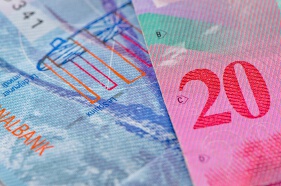
The Swiss franc is overvalued compared to the euro, but the nation and its businesses âcan live withâ the current exchange rate, says Ueli Maurer, Switzerlandâs Finance Minister. The Swiss franc, which has gained more than 5% against the euro over the last 12 months, is dipping on Thursday after his remarks.
Speaking in an interview with Reuters earlier this week, Maurer said that his government would prefer to see an exchange rate of 1.20 rather than the current 1.16, but this is something âwe can live with.â He also lauded the Swiss National Bank for making âgood policy,â but Maurer has lamented on the central bankâs $1.1 trillion balance sheet in the past.
Maurer is still concerned about the balance sheet, telling the newswire:
Of course, with all this intervention, we have a big, big balance sheet, but that’s a result of the policy of the last year and the pressing of the Swiss franc and the weakness of the euro.
In recent months, the franc has weakened against the euro amid tense trade relations with the European Union (EU) pertaining to cross-border training and a new bilateral agreement. However, investors have returned to the safe-haven currency in July because of the present volatile environment, stemming from geopolitical risks and trade spats.
The European Commission have been involved in a bitter dispute over Switzerlandâs stock market rules because EU investors can trade on Swiss bourses. Maurer insists the two sides continue have âexcellent relationsâ and that âsome solutionsâ would be found by the end of the year.
Meanwhile, Bloomberg is reporting that the Swiss franc and Scandinavian currencies would be âparticularly vulnerableâ to a global trade war. Danske Bank A/S. Hungary believes the franc, Danish krone, and Swedish krona would be most affected because they account for small and open economies. The US dollar and the Japanese yen would be âleast exposed,” something that may surprise average investors because the US and China are engaging in a bitter trade dispute.
The Scandinavian currencies are vulnerable to an escalation of the trade war mostly because they are small, open economies and in Denmarkâs case dependent on global shipping activity.
[The Swiss franc] also scores high due to the fact that it is a small open economy, but also with relatively high exposure to the Chinese economy.
The EUR/CHF opened at 1.1631, but the currency pair has dipped 0.05% to 1.1623 at 15:31 GMT on Thursday. The EUR/USD currency pair tumbled 0.33% from 1.1638 to 1.1603.
If you have any questions, comments or opinions regarding the Swiss Franc,
feel free to post them using the commentary form below.